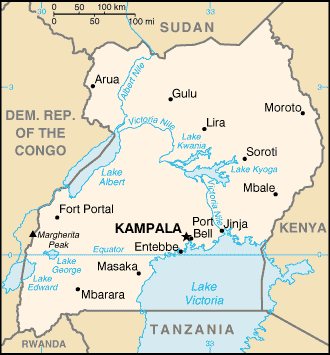Uganda

The Republic of Uganda has an estimated population of 33.8 million (UN, 2010). The main languages are English (official), Swahili (official), Luganda, and various Bantu and Nilotic languages.
Uganda gained its independence in 1962 from Britain. For over two decades, the Lord's Resistance Army (LRA) has spread terror in the Northern part of the country. Tens of thousands of people have been killed or kidnapped and up to 1.6 million people are internally displaced. Thousands of children have been kidnapped by the LRA to be used as fighters.
There is a high level of traditional and societal discrimination against women, mainly in rural areas. Violence against women is a serious problem in Uganda. More than 78 percent of women in Uganda continue to experience domestic violence. According to the 2009 Police Crime Report, there was a rise in reported cases of deaths resulting from domestic violence, from 137 in 2008 to 165 in 2009. Violence against women such as rape, forced and early marriage are widespread in Uganda. Women are also abducted and raped by the LRA.
- Uganda ratified the Protocol to the African Charter on Human and Peoples' Rights on the Rights of Women in Africa (The Maputo Protocol) on the 22nd of July 2010.
- The Convention on the Elimination of All Forms of Discrimination against Women (CEDAW) was ratified by Uganda on the 22nd of July 1985.
- Uganda launched its National Action Plan on United Nations Security Council Resolution 1325 (UNSCR) in December 2008.
- From June 1993 to September 1994, there was a UN peacekeeping mandate in Uganda: United Nations Observer Mission Uganda-Rwanda (UNOMUR).
